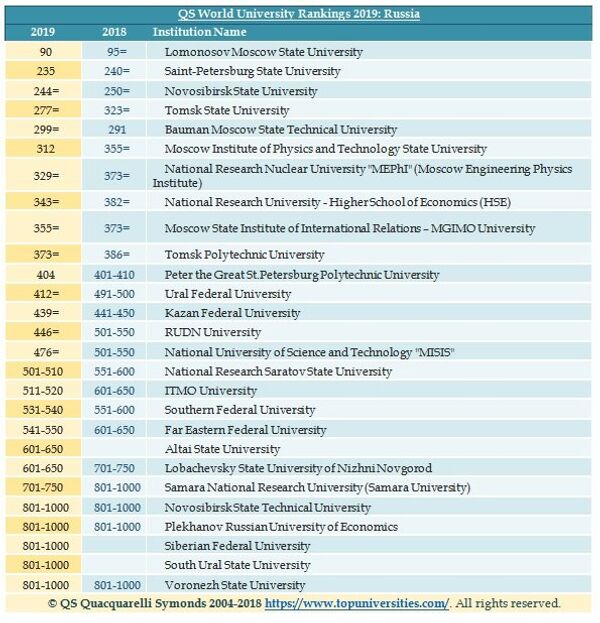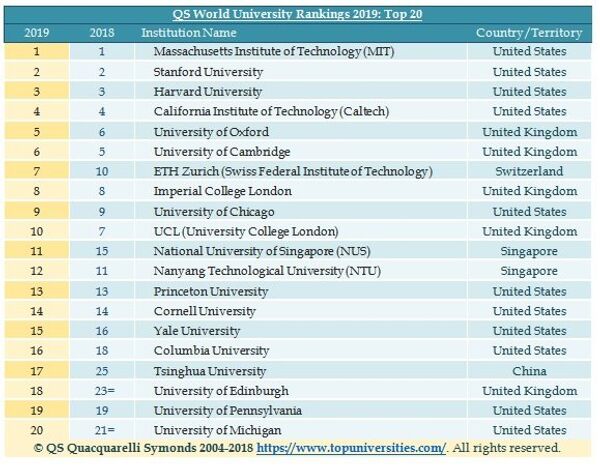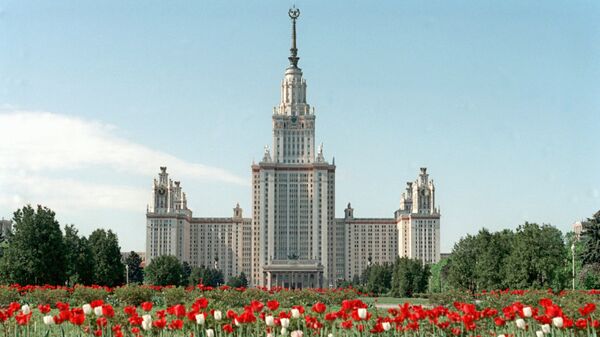The fifteenth edition of the QS World University Rankings, released today by global higher education analysts QS Quacquarelli Symonds, sees 70% of Russia’s 27 ranked universities improve their position, with only one falling. The nation’s leader is Lomonosov Moscow State University once again, which rises from 95th to 90th: its highest rank since QS started compiling the rankings alone.
Globally, Massachusetts Institute of Technology remains the world-leader for a record-breaking seventh consecutive year. QS now rank the world’s top 1000 universities, which hail from 85 different countries, and their flagship website, www.TopUniversities.com is due to be visited over 65 million times this year by stakeholders in the higher education sector, according to current projections.
Russia: Key Facts
- Of Russia’s 27 ranked universities, 19 improve their position. 3 are newly-ranked this year, and 4 remain stable within their band or in their position. Bauman Moscow State Technical University is Russia’s only falling institution, and its drop is a minor one (299th, down from 291st);
- Russia’s rises can be attributed to consistent improvements in two of the six metrics used by QS to compile the ranking;
- 19 of Russia’s 27 institutions achieve improved ranks for Employer Reputation, which accounts for the opinions of 42,000 employers around the world about the quality of an institution’s graduates;
- 18 of Russia’s 27 ranked universities are recording improved ranks for International Student Ratio, indicating that Russia’s attempts to achieve rapid inbound international mobility increases are proving successful;
- Students in Russia – whether domestic or international – can benefit from some of the smallest class sizes of any university in the world. Russian universities achieve 14 of the top 100 scores for Faculty/Student Ratio, which measures class sizes as a proxy for teaching quality. 6 Russian universities achieve one of the top 50 marks for this indicator.

- The UK’s top institution has changed for the first time since QS began compiling the rankings alone (2011), with the University of Oxford (5th) usurping its longtime rival, the University of Cambridge (6th);
- Both the United Kingdom and the United States have seen their performance stabilize, with slightly more improvements than drops;
Continental Europe’s best university remains ETH Zurich, which has reached its all-time highest rank (7th) after improving its research performance and faculty/student ratio;
- Singapore is again home to Asia’s two best universities. The National University of Singapore regains the continental supremacy it lost last year, rising to 11th position. Nanyang Technological University ranks 12th. Tsinghua University becomes the first Chinese top-20 university since QS’s first standalone compilation.
- Australia loses its only top-20 institution, with the Australian National University falling from 20th to 24th.

Ben Sowter, Research Director at QS, said: “Russia is a nation with highly ambitious targets for its higher education system, and this year’s results demonstrate that its aggressive strategy seems to be yielding significant improvements. In particular, the scores it receives in our internationalization indicator are a testament to its attempts to entice international students, both through the effort it has made to create courses targeted at international students, and through the legislative work it has done to reform international student visa provision.”
Sowter continued: “We also see the continued progressions made by institutions participating in the 5-100 government scheme. Of the 21 participants, 16 are now ranked – two more than last year – and 13 of the 14 participants ranked both this year and last improve their rank.”




